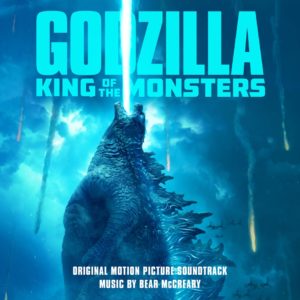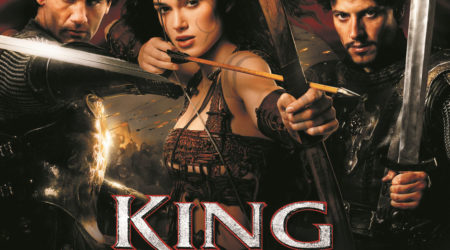
If you look at the musical output of American composer Bear McCreary in 2019, it is hard to believe he is only one person. At the moment of writing this review, he has scored music for at least four TV series and six movies, including Godzilla: King of the Monsters. Not only is this movie a sequel of Godzilla from 2014, with beautiful music by Alexandre Desplat, it also marks McCreary’s debut scoring for a huge Hollywood blockbuster, so let’s have a closer look on the quality of this soundtrack
First of all, let’s scrutinize the themes. It should not be a huge spoiler that Godzilla is not the only kaiju (the Japanese name for the gigantic beasts) in the movie, and the important kaiju are all accompanied by their own theme. Most of the time when thinking about themes, you think of stand-alone pieces of music that can be integrated into the score, but this is not really the case for this movie: each theme is more like a collection of musical motives and ideas instead. “Godzilla Main Title” is a splendid example of this concept. The track starts with a melody of fourteen long brass bursts as the first motive and transitions straight into the second one, which is the Godzilla theme. This theme is one of the two marvelous wonders of this score: It is an adaption of the original Godzilla theme from the 1954 movie, composed by Akira Ifukube. Even the brass notes at the start of the track are apparently used in old Godzilla movies. The track also has a third motive, featuring a choir of Japanese vocalists, doing battle cries and shouting words like ‘Gojira!,’ which is the Japanese name for Godzilla.
The second major theme represents the gracious, but still gigantic, kaiju Mothra and is the second marvelous musical wonder on this album, because the theme is an adaptation of “Mothra’s Song” from the 1964 movie Mothra. McCreary did not use the lyrics from this song, but the melody is played by two flutes instead, creating a beautiful piece fit for this gracious monster. In the finale of the piece, the flutes are supported by the rest of the orchestra, for a grander sound which fits the size and the power of the animal.
The third kaiju theme, for the three-headed Hydra Ghidorah, is an original piece written by McCreary and contains two important motives that can be heard in “Ghidorah Theme.” The first motive consists of Buddhist monk prayers, which are a continuous wave of words, with an additional extremely low voice providing the foundation, making the music sound very dark and sinister. The second motive is characterized by heavy brass lines, which are conveniently structured in a pattern of three beats, one for each head, which are combined with the prayers.
The last kaiju theme is for Rodan, and the most important motive for his theme consists of extremely high-pitched ripping French horn sounds. These sounds are prominent in the track “Rodan.” The second half of that track is a delight as well with percussion, the ripping French Horns, heavy brass and Japanese battle cries shouting the monster’s name.
In addition to these four kaiju themes, there are three further themes present on the score. The first one is the Monarch theme, which is prominently featured in “Welcome to Monarch,” and since it is only played by the orchestra, without any voices or other instruments, it sounds very formal and human. As a contrast, the Ancients theme is not. The music represents the kaiju in ancient times and is a simple melody line played on a foreign string instrument and sounds very mysterious, as can be heard in the beginning of “Memories of San Francisco.” At the end of “King of the Monsters” the same melody is repeated very bombastically with the Godzilla battle cries laid on top. Finally, the last theme I want to mention is the Family Russell theme, which is often just a short melody of a couple of notes on a bell-like instrument. Most of the time, it sounds very emotional and sad, which is a common theme for the family, who plays a major role in this film.
I have never written so much about themes in a soundtrack review before, but each theme is just a brilliant musical piece by itself and it does not end there. What makes film music great is its ability to tell stories with music. Each theme is just a simple melody or a collection of recognizable musical ideas, and these smaller elements are easier to integrate throughout the whole score. I already mentioned “King of the Monsters,” in which we could listen to a combination of the Ancients theme and the battle cries of the Godzilla theme, supporting the scene where this happens with the combination of these two theme elements. It happens throughout the whole score, and the best example is “Battle in Boston,” where pieces of all kind of themes blend together and many motives can be heard in some form or another. Sometimes it is the melody or one of the musical motives from a theme. I have heard all the motives from the Godzilla theme, the prayers from the monks representing Ghidorah, the screaming French horns from Rodan, the gorgeous melody of Mothra and the Russell theme on the piano. This track is a perfect example of how musical representation of important characters can be integrated into a sequence of background music that supports the visuals. I have seen the movie, and listening to a track like this enables me to relive a specific scene with the help of these recognizable musical elements.
You probably have noticed that I really appreciate this score a lot, and I am not even done. There are still two tracks that need mentioning. The first track on the album is a song that was released before the movie. It was a collaboration between McCreary and System of a Down singer Serj Tankian. I love the music from that band, and the mix of the music from McCreary with the amazing voice of Tankian created an impressive song, worthy of a monster like Godzilla. The second piece is a gorgeous emotional sequence that can be heard in “Goodbye Old Friend,” which is, as McCreary has explained himself on his website, a poem in the Babalonic language, sung beautifully by a traditional choir.
This score is Bear McCreary’s first soundtrack for a blockbuster movie, and he totally delivered. As I have been disappointed by music for big-budget movies many times, I was hoping that McCreary would be able to reinvigorate the music for these big movies, and he did not fail. Hollywood take note: If you need a composer for your big movie, see if McCreary can make a gap for you in his incredibly busy schedule.
Listen or buy
- Buy this soundtrack from Amazon.com or iTunes
- Listen to this soundtrack on Spotify
Tracklist
The highlights are in bold.
- Godzilla (performed by Serj Tankian) (3:10)
- Godzilla Main Title (2:34)
- Memories of San Francisco (2:11)
- The Larva (4:23)
- Welcome to Monarch (2:54)
- Outpost 32 (7:03)
- Ice Breaker (2:33)
- Rise of Ghidorah (2:59)
- Old Rivals (3:49)
- The First Gods (5:18)
- Rodan (5:23)
- A Mass Awakening (5:32)
- The One Who is Many (5:37)
- Queen Of the Monsters (3:35)
- For Andrew (1:18)
- Stealing The Orca (3:04)
- The Hollow Earth (5:25)
- The Key to Coexistence (2:18)
- Goodbye Old Friend (2:54)
- Rebirth (2:03)
- Fog Over Fenway (2:53)
- Battle in Boston (7:51)
- Redemption (4:11)
- King of the Monsters (3:34)
- Ghidorah Theme (2:41)
- Mothra’s Song (2:10)
Total length: 1 hour and 37 minutes
WaterTower Music (2019)




